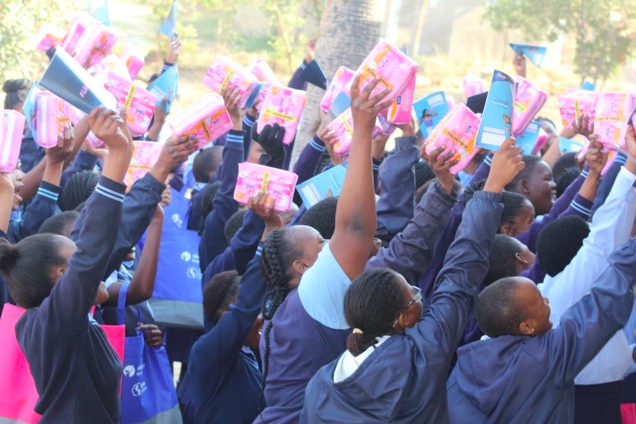Good Morning Angels: Supporting girls from rural schools to #ChooseToChallenge
Updated | By Breakfast with Martin Bester
Eric Mlamba founded the Footprints Foundation in 2014 to assist girls in rural schools across South Africa -and he received the biggest surprise.

BACKGROUND: A "challenged world is an alert world, and from challenge comes change”. But, it is not only up to women and girls to challenge inequality - men and boys are just as important to bring about an equal society. One such a man is Eric Mlamba, who founded the Footprints Foundation in 2014 to assist girls in rural schools across South Africa, to help claim their voice in a society that has been designed for them to be second-class citizens.
Eric worked as a journalist for ten years, ventured into PR for a few months, but then got back into journalism by writing for the United Nations Girl and Boy Education Movement monthly paper. This is when Eric saw first-hand how the odds are stacked against girls, especially in rural South Africa. He saw how something as basic as sanitary towels is keeping thousands of young girls from reaching their academic and educational potential, to remain marginalised and in a life of poverty.
Statistics show that 30% of South African schoolgirls miss school during their menstruation time because they don’t have access to sanitary pads. As a result, they may resort to using less hygienic alternatives, like tissues or cloths. Following an outcry from communities and presenters on radio stations, Footprints Foundation (like many other South African organisations) is determined to make a meaningful difference to break the cycle.
As a father, expecting a baby girl himself, Eric stepped up and chose to challenge the status quo.
The Footprints Foundation has grown from strength to strength and they run several programs in rural schools to uplift and empower young South Africans born into poverty. One of these programs is the Always Keeping Girls in School programme, which assists between 18- and 24-thousand girls in seven provinces with sanitary towels annually.
According to the program, the schools and the girls sign up and their school progress is monitored until they matriculate. The Foundation also assists girls who have applied for NFSAS funding at tertiary level, to raise their registration fees, which are not covered by the funding. To date, 200 girls have been assisted in this way to register and study!
The Footprints Foundation is completely self-funded and relies on the generosity of sponsors like the Obama Foundation. Eric says they are blessed with donations of sanitary towels, but the distribution is very costly - as they distribute from their storage facility in Johannesburg to far flung rural areas. In Limpopo alone, Footprints assists girls in 27 schools with sanitary towels, that are delivered every term.
REQUEST FOR: Eric Mlamba and the Footprints Foundation’s Sanitary Towel Project in Limpopo
ANGEL: Retha Ingenbleeck from Spar North Region
SPONSORING: Spar will be donating 10-thousand packs of sanitary towels to Footprints to the value of R50,000. From the funds raised through last years’ Spar Virtual Women’s Challange, a donation of R50,000 will be made to Footprints to assist with the distribution costs of the sanitary towels to school girls.
MORE ABOUT THE FOOTPRINTS FOUNDATION:
Footprints Foundation aims to level the playing field in the ordinary lives of African boys and girls. We do so by partnering with young and influential leaders from across the content. Changing the face of our local communities, countries, regions and the continent, to produce a generation of visionary, caring and moral young African leaders. Our theory of change is based on the idea that if we work towards a common cause, with people who don’t give up, then you will succeed and change will follow. The Theory of Change directs how we choose our causes and initiatives, how we implement them and roll them out and what we do with the money that is donated and fundraised.
The Always Keeping Girls in School Programme: Girl learners receive sanitary pads, along with a puberty-education session that is facilitated by a trained nurse or nursing student. The learners also receive puberty-education booklets and bags. The puberty-education sessions address information and education about menstruation by teaching them about the female reproductive system and helping to normalise the event and it impacts their everyday lives. The facilitator also demonstrates how to use a sanitary pad, the disposal thereof, and keeping hygienic. Other fun elements are included, like ice breakers and songs and where time permits, career guidance also forms a part of the sessions. These visits to schools take place every term, when pads are delivered.
Image credit: Supplied
Show's Stories
-
Traveller panics when air hostess hands her a candle
A woman became uneasy when she was handed a battery-operated candle shor...
The Workzone with Alex Jay 1 day, 3 hours ago -
The Landing Coffee Shop in Edenvale
Here's to landing a cute coffee spot with champion baristas who bring an...
The Workzone with Elana Afrika-Bredenkamp 1 day, 3 hours ago